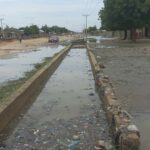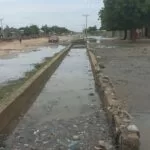
Local authorities have confirmed at least 132 cholera cases in Yobe state, northeast Nigeria, with about nine deaths—a 6.8 per cent fatality rate. “The delay in seeking treatment has significantly contributed to these fatalities,” said Dr Muhammad Lawan Gana, Yobe’s Commissioner for Health.
According to Dr Gana, the outbreak is prevalent in Gujba, Fune, Machina, Nangere, and Nguru local government areas, which are already struggling with disrupted infrastructure due to heavy rainfall and flooding. These conditions have severely impacted water supplies, leading to contamination and a surge in Acute Watery Diarrhea (AWD) cases.
A week ago, international humanitarian healthcare organisations, including Médecins Sans Frontières (MSF), warned of an imminent risk of malaria and cholera outbreaks in the region following the devastating floods. “We have seen some cases with clinical signs of cholera since the floods. Without increased support, especially in water, sanitation, and hygiene, the number of cases will likely rise,” said Dr Issaley Abdel Kader, MSF Head of Mission in Nigeria, in a statement.
“Immediate reporting of symptoms is crucial to saving lives,” Dr Gana stated. The commissioner noted that the state government confirmed the presence of Vibrio cholera following collaborative efforts with the World Health Organization (WHO), UNICEF, and Action Against Hunger. “We need all sectors and community leaders to join forces in combating this outbreak,” he added.
Dr Gana also highlighted the role of the media in raising awareness about prevention measures. “Public education is vital to controlling this outbreak,” he stressed.
The insurgency in northeastern Nigeria has further complicated response efforts, damaging roads and limiting access to affected areas.
“The focus,” Dr Gana said, “remains on curbing the spread and reducing the fatality rate as swiftly as possible.”
Local authorities in Yobe state, northeast Nigeria, reported 132 confirmed cholera cases, resulting in nine deaths.
Dr. Muhammad Lawan Gana, Yobe’s Commissioner for Health, noted that delayed treatment has contributed to the fatalities.
The outbreak primarily affects Gujba, Fune, Machina, Nangere, and Nguru areas, already grappling with infrastructure damage from heavy rainfall and flooding, leading to contaminated water supplies and increased Acute Watery Diarrhea (AWD) cases.
Médecins Sans Frontières (MSF) and other humanitarian organizations have warned of rising malaria and cholera risks post-flooding.
Collaborative efforts from the World Health Organization (WHO), UNICEF, and Action Against Hunger have confirmed the presence of Vibrio cholera. Dr. Gana emphasized the importance of immediate symptom reporting and public education to combat the outbreak, highlighting media’s role in prevention awareness.
The ongoing insurgency further complicates response efforts by damaging roads and limiting access to affected areas.
